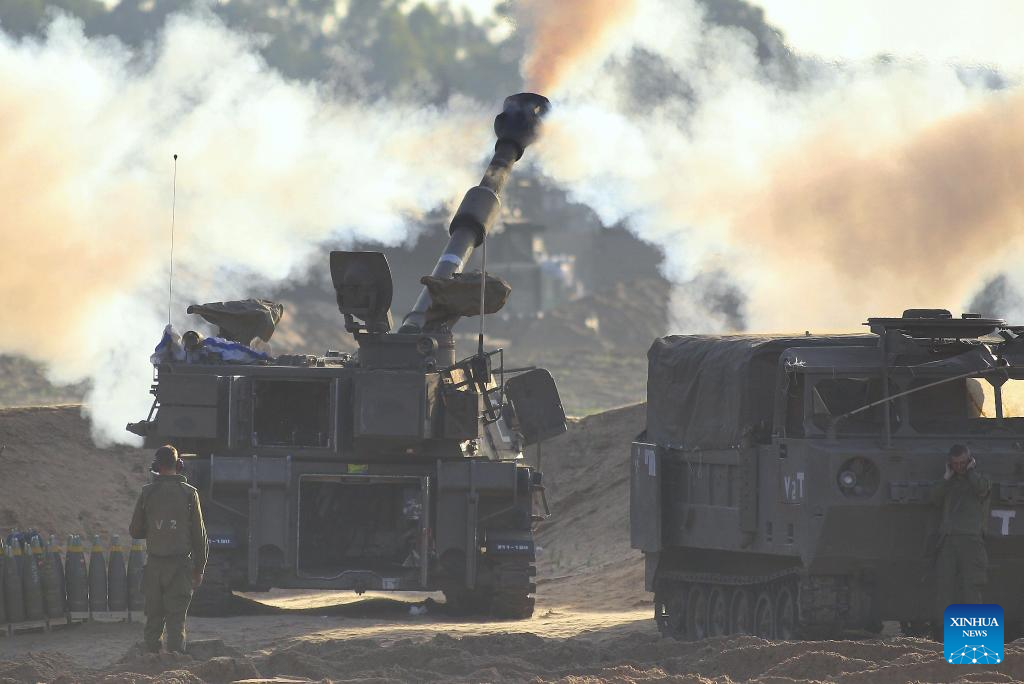The resolution received 13 votes in the 15-member Council with Britain abstaining on Friday but was cut down by Washington’s veto, reports Arul Louis
Brushing aside an impassioned plea by Secretary-General Antonio Guterres, a diplomatically isolated United States has again vetoed a Security Council resolution calling for an immediate humanitarian ceasefire in the Hamas-Israel conflict.
The resolution received 13 votes in the 15-member Council with Britain abstaining on Friday but was cut down by Washington’s veto.
The veto came exactly two months after Israel launched retaliatory attacks on Gaza for the terrorist onslaught a day earlier by Hamas, which rules the territory.
This was the second resolution on Gaza that the US vetoed; another was vetoed by Russia and China, and two failed to get the minimum of nine votes required to pass as the Council grappled with the crisis.
But last month, the Council adopted a resolution calling for a humanitarian pause in the fighting – a more limited cessation of hostilities with a specific aim – when the US, Russia and Britain abstained saving it from a veto after the failure of the four earlier attempts at an action on Gaza.
That led to a four-day pause — extended by two days — in fighting starting last month to allow relief supplies into Gaza and for the release of some of the about 240 hostages taken from Israel by Hamas and other terrorist groups.

Friday’s resolution backed by about 90 countries was proposed by the United Arab Emirates, whose Deputy Permanent Representative Mohamed Issa Abushahab asked, “What is the message we are sending civilians across the world who may find themselves in similar situations” by being unable to pass the resolution.
Explaining the veto, US Deputy Permanent Representative Robert Wood said that it was calling for an “unsustainable ceasefire that will only plant the seeds for the next war”.
Moreover, he said, it did not condemn the 7/10 Hamas attack on Israel or affirm Israel’s right to self-defence.
The attempt to pass a resolution for a Gaza ceasefire came after Guterres on Wednesday invoked a rarely used provision of the UN Charter to call the Council’s attention to the crisis in that territory from Israel’s retaliatory attacks.
He asked the Council to act to “avert a human catastrophe” warning, “There is a high risk of the total collapse of the humanitarian support system in Gaza, which would have devastating consequences”.
He used Article 99 of the Charter that had been invoked only three times before to make the call to action by the Council, about the only power given to the Secretary-General to act in a crisis.
He warned the Council on Friday “I fear the consequences (of the conflict) could be devastating for the security of the entire region” and spread elsewhere constituting a threat to international peace,
Making his plea for a ceasefire, Guterres told the Council, “The people of Gaza are looking into the abyss”.
They “are being told to move like human pinballs – ricocheting between ever-smaller slivers of the south, without any of the basics for survival”, he said. “But nowhere in Gaza is safe:.
He said that he “unreservedly” condemned the Hamas attacks that killed about 1,200 people including 33 children and resulted in hundreds taken hostage, and that he was “appalled by the reports of sexual violence”.
He also had strong words for Israel noting: “At the same time, the brutality perpetrated by Hamas can never justify the collective punishment of the Palestinian people”.
He noted that 17,000 Palestinians, including more than 4,000 women and 7,000 children, have been “reportedly” killed in Israeli operations.
“While indiscriminate rocket fire by Hamas into Israel, and the use of civilians as human shields, are in contravention of the laws of war, such conduct does not absolve Israel of its own violations”, he said.
In a remark apparently aimed at the US, which he did not name, he said, “International humanitarian law cannot be applied selectively. It is binding on all parties equally at all times, and the obligation to observe it does not depend on reciprocity”.
Israel’s Permanent Representative Gilad Erdan criticised Guterres for invoking Article 99 saying that he did not use it while the world was reeling from Russia’s invasion of Ukraine or for other crises.
He said that regional stability can “only be achieved once Hamas is eliminated”.
Palestine’s Permanent Observer Riyad Mansour accused Israel of “conducting the war, through atrocities” and added that denying a ceasefire will not end them.
The General Assembly in October passed by an overwhelming majority a resolution calling for a ceasefire.

It received the votes of 121 members, while 14 voted against it and 45 including India abstained, showing broad support for a ceasefire.
India said it was abstaining because the resolution did not condemn Hamas terrorism.
The veto came as President Joe Biden is facing growing calls for a ceasefire from many, even those in his party, and large demonstrations while his unwavering support for Israel is backed by a broad political spectrum from his party and the Republican side.
To meet the criticism of his backing for Israel while its actions in Gaza his civilians, the Biden administration has been counselling Israel to take more precautions to protect civilians.
Vice President Kamala Harris, who has spoken to Israel’s President Isaac Herzog, said, “As Israel pursues its military objectives in Gaza, we believe Israel must do more to protect innocent civilians.”
ALSO READ: Biden Stresses ‘Critical Need To Protect Civilians’
